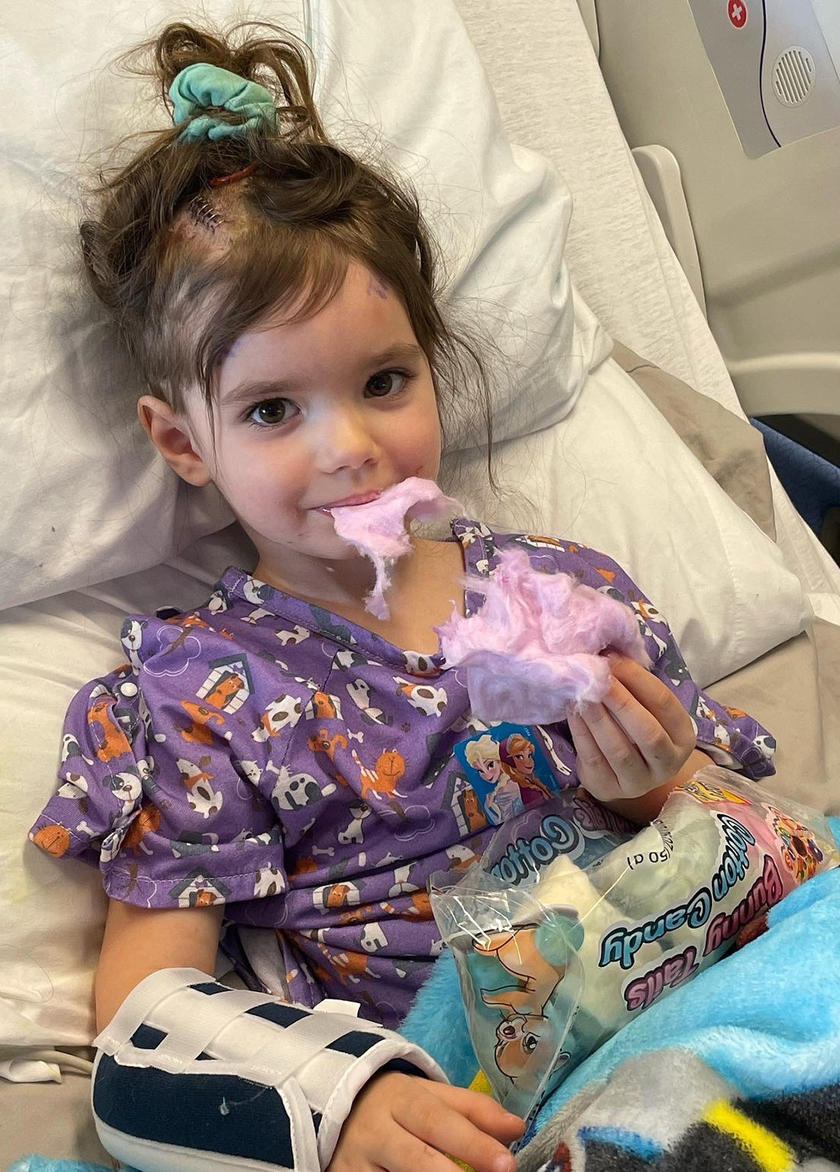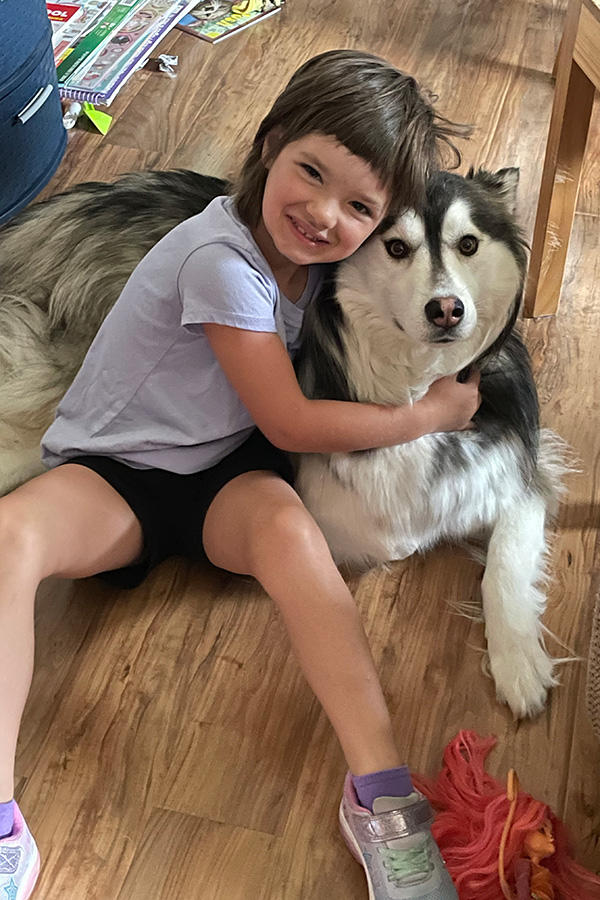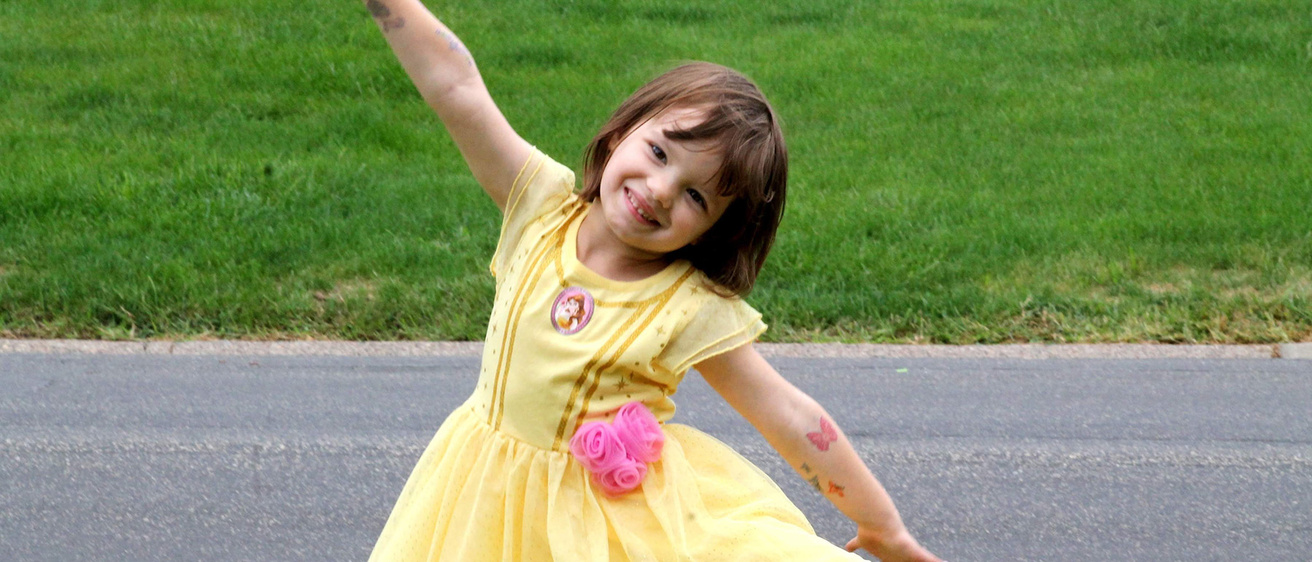After experiencing mysterious symptoms, a second opinion led Scarlette Wheelock to UI Health Care Stead Family Children’s Hospital, where specialists discovered the preschooler from Clinton, Iowa, had brain cancer. Her tumor has remained stable since her treatment.
Story: Jeff Raasch
Photography: courtesy of Ashley Huebner
Published: April 17, 2023
It was news Ashley Huebner didn’t want to receive.
“Your child has a mass on her brain,” a neurosurgery resident physician told her. “We need to do surgery right away.”
Ashley’s 4-year-old daughter, Scarlette, had been experiencing a variety of concerning symptoms for the past several weeks. Local doctors had provided a diagnosis, but Ashley had a feeling that something more was going on.
At a pediatric urgent care clinic in Davenport, a provider told Ashley they needed to go to University of Iowa Health Care Stead Family Children’s Hospital immediately for a CT scan. They did, and now they knew surgery was needed.
While in the emergency department, Ashley tried to provide some solace to her daughter.
“This is where we’re going to get our answers so you can start feeling better,” she told Scarlette.
Unknown cause for Scarlette’s symptoms
Starting in late February 2022, Scarlette Wheelock would wake up every morning with a stomachache. Nausea, headaches, and difficulty swallowing were common. She also had trouble speaking, and despite the speech programs she was enrolled in, it seemed to be getting worse.
Initially, local doctors believed the symptoms were related to the bouts of COVID-19 and influenza she had experienced in recent months.
A couple of weeks later, Scarlette’s father noticed that the right side of her face was drooping. A local doctor diagnosed Scarlette with Bell’s palsy. The symptoms persisted.
Then, in late March, Scarlette’s right eye had turned toward her nose. By this time, she was vomiting every morning.
Ashley says she’s thankful she decided to get the second opinion that led her to Stead Family Children’s Hospital. It wasn’t the news she wanted, but she had a sense of relief, even with the necessity of brain surgery.
“Of course I was scared — that’s my baby, and she’s only 4,” Ashley says. “But I was relieved to finally know what was causing all her issues, and I knew we were in the right place to get it taken care of.”

Pediatric Brain Tumor Clinic: First of its kind in Iowa
The Pediatric Brain Tumor Clinic at University of Iowa Health Care Stead Family Children’s Hospital is the first of its kind in Iowa and one of just a few in the United States. The clinic is multidisciplinary and collaborative, which means specialists from a variety of areas come together to create a personalized treatment plan for every patient.
Getting answers
Doctors with the Pediatric Brain Tumor Clinic at Stead Family Children’s Hospital — the first of its kind in Iowa and one of just a few in the United States — discovered that the ventricles in Scarlette’s brain were starting to swell. Surgeons first placed a shunt to relieve the pressure.
During her second surgery in as many days, a surgical team addressed Scarlette’s tumor, which was located along her brainstem. They removed about 70% of the tumor during the eight-hour procedure. Scarlette’s vitals were starting to drop, so a plan was made to attack the rest of the tumor with chemotherapy.
“Of course I was scared — that’s my baby, and she’s only 4. But I was relieved to finally know what was causing all her issues, and I knew we were in the right place to get it taken care of.”
Tests of the tumor revealed that Scarlette had a pilocytic astrocytoma. The slow-growing tumor was cancerous, but it had not spread. David Dickens, MD, who helped treat Scarlette, says pilocytic astrocytomas that are not treated can lead to neurologic deterioration and eventually death.
“Most medical providers have never seen a case, which is why there is often a delay in diagnosis,” Dickens says. “There are signs and symptoms that mimic other more common conditions.”
Immediately after the surgery, Scarlette’s speech began to improve, and other symptoms eventually went away. She was discharged after 11 days in the pediatric intensive care unit (PICU).
Dickens says brain tumor patients at Stead Family Children’s Hospital routinely receive care from six service lines — neurosurgery, oncology, radiation oncology, radiology, pathology, and the PICU. Two pediatric oncologists dedicated to caring for children with brain tumors joined the team in 2022 from nationally-ranked programs — Scarlette’s current oncologist, Maggie Seblani, DO, MPH, and Andrew Groves, MD.
“There are teams of physicians, nurses, advance practice providers, pharmacists, social workers, and others that all collaborate to coordinate care,” Dickens says. “It’s an enormous amount of professionals and minds that help care for every individual patient.”
Ashley says Scarlette’s care team looked for ways to give her daughter a sense of control over her situation. She says the kindness and empathy shown during their stay “made us feel like family.”
“She loved the games they would play with her, and the wagon rides they would take in the PICU,” Ashley says. “They even had a little parade with all the other kids in the hallway.”
The road ahead
Each week for about 14 months, Scarlette and Ashley made the 90-mile trip from Clinton to Stead Family Children’s Hospital for chemotherapy. They came on Wednesdays because Scarlette didn’t have preschool that day.
Scarlette finished chemotherapy in July 2023, and her tumor has not grown at all. She returns to the hospital every three months for MRI scans. Scarlette wants to be nurse when she grows up so she can “help the kids who get chemo.”
Dickens says Scarlette’s prognosis is “excellent.” About 90% of children who develop a pilocytic astrocytoma will be long-term survivors.
Ashley encourages all parents to advocate for their children when something isn’t right. She knows Scarlette is in a better place now because she didn’t stop looking for answers.
“She is doing wonderful,” Ashley says of Scarlette. “You should never have to consider a hospital your second home, but if you do, this is the hospital. They treat your kid like a kid, even in the most intense circumstances.”

Scarlette Wheelock enjoying cotton candy in the hospital.

Ashley Huebner says her daughter Scarlette “is doing wonderful.”
